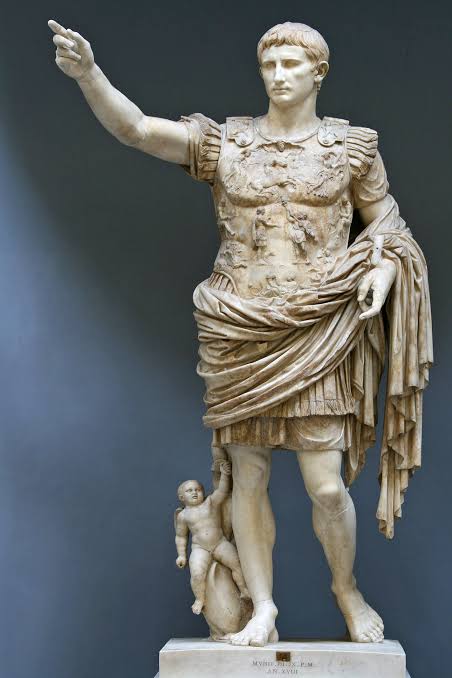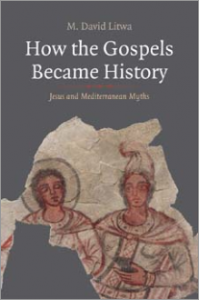This post is a correction to the conclusion of what I wrote in Review, part 6b. Litwa on “Mythistorical” Prophecies, Biblical and Greco-Roman
I concluded my most recent review of M. David Litwa’s How the Gospels Became History: Jesus and Mediterranean Myths with the concession that when writing of Augustus Suetonius expresses none of the distancing of his own views from his accounts of miracles that we find typical in other historians. There is no expression of doubt. It is all told as simple matter of fact. Comparable, that is, to the telling of any other poetic myth or even the gospel narratives of Jesus. I wrote:
* The Greek hero Heracles is clearly categorized as mythical—especially by modern people. Yet the mythological template exemplified by Heracles played out in the lives of figures still deemed historical: Alexander the Great, Caesar Augustus, and Jesus himself. When historiography follows a mythic pattern, however, it is no longer simply a record of past events. It is what we are calling mythic historiography. (Litwa, p. 101)
An Exception in Litwa’s Favour
In the above quotation* mention is made of Caesar Augustus. Earlier Litwa had informed readers of the Roman historian Suetonius’s account of the prophecies relating to Augustus’s birth. In this case the evidence Litwa is claiming for his thesis is more secure. Suetonius did often (not always) write of many bizarre events (including human ones, not only supernatural prodigies) that read more like a scandal rag’s gossip than serious history. Here is Suetonius on the prophecy about Augustus:
On the day Augustus was born, when the conspiracy of Catiline was being discussed in the senate house and Octavius stayed away until late because his wife was in labour, Publius Nigidius, hearing why he was delayed, when informed of the hour of the birth, asserted (as is generally known) that the master of the world was born. When Octavius, who was leading an army through remote regions of Thrace, sought guidance concerning his son at some barbarian rituals in the grove of Father Liber, the same prediction was made by the priests, for so great a flame had leapt up when they poured wine on the altar, that it passed beyond the peak of the temple roof and right up to the sky, a portent which had only previously occurred when Alexander the Great offered sacrifice at that altar. And on the very next night thereafter, he dreamed he saw his son of greater than mortal size with a thunderbolt and sceptre and emblems of Jupiter Best and Greatest and a radiate crown, on a chariot decorated with laurel drawn by twelve horses of astonishing whiteness.
When Augustus was still a baby, as is recorded in the writings of Gaius Drusus, he was placed one evening by his nurse in his cot on level ground but the next morning he had disappeared. He was only found, after a long search, in a tower of great height where he lay facing the rising sun. When he first began to speak, he ordered some frogs to be silent who happened to be croaking in his grandfather’s villa and they say that from that time no frog croaked there. . . .
So Litwa can rightly say that some historians wrote of prophetic pronouncements in the same way as did poets, novelists and the evangelists.

I confess I was surprised a little when I re-read Suetonius’s “Life of Augustus” because it did indeed, on this particular point, stand as an exception to the rhetoric of quite a number of other Roman and Greek historians I have read. So I did a little digging to try to see what explanations were out there for this exception.
The Exception that Proves the Rule (contra Litwa)?
The answer I was looking for was found in a 2012 article by D. Wardle, “Suetonius on Augustus as God and Man”, in The Classical Quarterly. Wardle himself points out that Suetonius writes of Augustus in a manner quite different from how he writes of any other Roman emperor. That is, Suetonius’s account of Augustus is not only an apparent exception to the way many other surviving ancient historians wrote, but it is an exception even to how Suetonius himself normally wrote. Suetonius really did accept as “seriously true” the divinity of Augustus Caesar.
Suetonius’ Divus Augustus, by comparison with the other divi, appears to be a deity whom Suetonius is encouraging his reader to take seriously. His deliberate framing of Augustus’ life by passages that place great emphasis on the real divinity of Augustus is unique in the Lives. While this might be put down to a desire for variety, other Lives do share similar structures. And it seems likely that for Suetonius Augustus’ divinity was qualitatively different from those of the other divi. There is not the slightest hint in Suetonius of the equivocation that marks the culmination of Pliny’s discussion of the misfortunes of Augustus: in summa deus ille caelumque nescio adeptus magis an meritus. In the biographer’s presentation of Augustus the material that involves the emperor’s godhead demonstrates a vital element of what the emperor was to the world over which he ruled and had ruled.
Wardle appears to be saying that Suetonius’s presentation of Augustus is different from his biographical accounts of other emperors because he (Suetonius) believed Augustus was a literal god.
Historians of that era sometimes mocked the notion that any mortal was declared to be a god. But Wardle finds significance in the way Suetonius emphatically presents Augusts as a veritable divinity before he embarks on narrating his very mortal and fallible human career. Never does Suetonius at any moment suggest any doubt about the divinity of Augustus. In the cases of other emperors, Suetonius does write like other historians — expressing a certain personal detachment from the “facts” he is narrating. Suetonius
The expression of his face, whether he was speaking or silent, was so calm and serene that one of the leading men of Gaul confessed to his fellows that he was so impressed and won over that he abandoned his plan to throw the emperor over the cliff, when he was admitted to his presence as he was crossing the Alps. His eyes were clear and bright; he liked it to be thought that they revealed a godlike power and was pleased if someone who regarded him closely then lowered their gaze, as though from the sun’s force. . . .
It is said that his body was mottled with birthmarks spread out over his chest and stomach which in their shape, number, and arrangement resembled the constellation of the bear.
(Suetonius, Deified Augustus 79-80)
Wardle explains the significance of that bear constellation:
The constellation of Ursa Major was recognized by the ancients as the axis around which the universe rotated . . . .
(Wardle, p. 318)
Signs abound, and without any intellectual distancing in the telling. Egyptians, Greeks, they all worshipped Augustus as divine while he was with them and were right to do so, just as right as to genuinely believe that he continued as a divinity post mortem.
More Names with Puns
Continue reading “Review, part 6bi: On That Exception in Litwa’s Favour. A (Qualified) Correction.”


